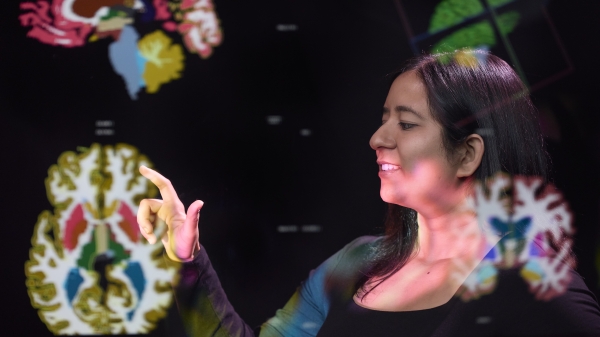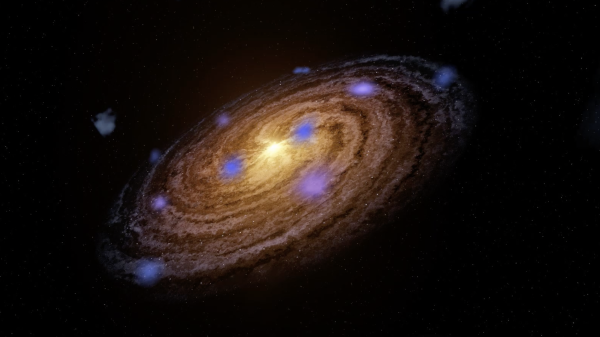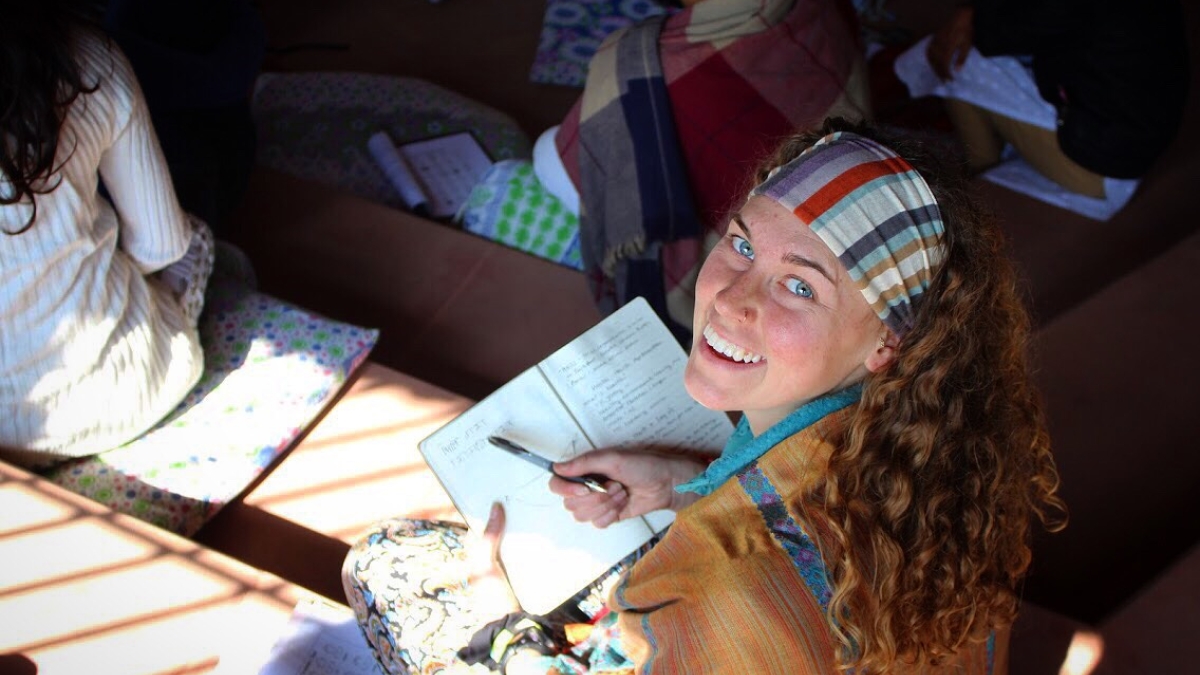Editor's note: This story is part of a series of profiles of notable spring 2020 graduates.
Delaney Bucker started her journey at Arizona State University as an athlete — swimming, biking and running her way to two NCAA National Championships on the women’s triathlon team.
After accomplishing this impressive feat, she was ready to reach new heights on her academic path. With a passion for community development, educational access, curriculum development and science communication, Bucker took a hands-on, interdisciplinary approach to her studies — finding a place for the humanities in biology.
Her unique combination of degrees, majors, minors and certificates illustrate her interdisciplinary spirit. This spring, Bucker, a Barrett, The Honors College student, will earn a bachelor’s degree in biological sciences from the School of Life Sciences in The College of Liberal Arts and Sciences with minors in Spanish and civic and economic thought and leadership, as well as a certificate in history and philosophy of science.
Along her path, Bucker, who was chosen as the spring 2020 dean’s medalist for the School of Life Sciences, often formed connections and established partnerships across departments at ASU and on a global level. Throughout her time at ASU this was seen in her exploration of a diverse span of activities and engagement in a variety of leadership positions in the lab, in the field and beyond.
Bucker says she could see herself pursuing a career in education after graduation but she is eager to continue learning and seeing what opportunities come her way in the next few months.
“I think one of the greatest lessons I've really grounded myself in is that learning does not terminate at all upon graduation,” Bucker said. “Even though I'm leaving university and maybe I won’t have a structured learning environment for the time being, I am actually leaving with the confidence that I am capable of learning anything and this is the time that my learning can flourish more than ever before.”
She shared more about her journey to becoming a lifelong learner.
Question: What’s something you learned while at ASU — in the classroom or otherwise — that surprised you or changed your perspective?
Answer: One big lesson I’ve learned is that we're all learners and we're all teachers. I felt I grew and changed in a positive way the most when I had professors who kind of acknowledged that they were still learning as well, and that their students were teachers to them. Having smaller classes, particularly in contrast to the large lectures, helped me realize how much I appreciate an approach to teaching where the teachers themselves were learners. It also inspired my own learning when I could come to the classroom and have something to teach to the class that the professor themselves was open to hearing. So I think that's a huge takeaway from university — framing myself as a continuous teacher and learner and also continuing to establish relationships with people around me who want to carry that same sentiment.
Q: What were some of the challenges you encountered while attending ASU and how did you overcome them?
A: I’ve found that a common theme in the biological sciences major is that people want to become doctors and I never entered with that as my aspiration or goal. But I think because of this I was continually questioning myself, telling myself, "If I'm in a major with all people who want to be doctors, either I also need to be a doctor as well or I shouldn't be in this major if I don't want to be a doctor.” So it was this personal struggle that I felt and I guess I wasn't confident in the creativity that I could bring forth in the major and that field of study. I had to get creative and find an interesting way to integrate my biological sciences background into the field of education that I want to go into. At first it was hard for me to really conceptualize. But I think the challenge that I had initially in understanding how these all link and how these form me as a person will kind of be an output of my university experience. It's been a challenge, but I think it's also been a great opportunity.
Q: What has been your best memory at ASU?
A: Best is a strong word but I would say some of the most impactful weeks I had at ASU were when I studied abroad in India. Through the perspective of economic thought and leadership, we looked at India globally and politically. We looked at the historical text of the making of India and we got to talk with people, working relatively closely within the political life in Delhi. But then in contrast, we also went and stayed in Tilonia, a very small, rural village. We were able to see and experience these two very different types of living that are both existing within a six hour bus ride from each other. That was a very dramatic experience and that's where my thesis project of contextualizing mental health in the rural community came from.
Q: What are your plans after graduation?
A: With intention and reflection I've gained confidence that my experiences have made something of themselves and will continue to do that. For right now, I really do feel my next step is that I'm ready to learn. I want to explore, gain and practice skills of self-sustainability like gardening, creating a greywater system in my house and growing my own food. I want to focus on establishing these very practical skills and the kind of lifestyle that I want to live. When it comes to contributing to my community I think my next step is looking into teaching opportunities. I see my long-term path going toward education or academia and thinking about educational models, educational systems and educational philosophy. I don't personally feel justified in going and knocking on the education system’s door without having been an educator myself. So I'd like to have that experience to build off of in the future.
Q: What’s the best piece of advice you’d give to students still in school?
A: Find your community. Really engage yourself on campus and explore different areas. There's so many opportunities and there’s such a rich diversity of opportunities on the ASU campus that even if you start one and you don't like it, move to the next one. There's so much opportunity to engage with people beyond just sitting beside them in lecture. Seek out opportunities that maybe don't seem the most connected. They will nonetheless add to your bank of skills and the experiences that will help you make the most of your time at ASU. Be a self-directed learner and know that your learning doesn't end after graduation.
More Science and technology

Podcast explores the future in a rapidly evolving world
What will it mean to be human in the future? Who owns data and who owns us? Can machines think?These are some of the questions…

New NIH-funded program will train ASU students for the future of AI-powered medicine
The medical sector is increasingly exploring the use of artificial intelligence, or AI, to make health care more affordable and…

Cosmic clues: Metal-poor regions unveil potential method for galaxy growth
For decades, astronomers have analyzed data from space and ground telescopes to learn more about galaxies in the universe.…
